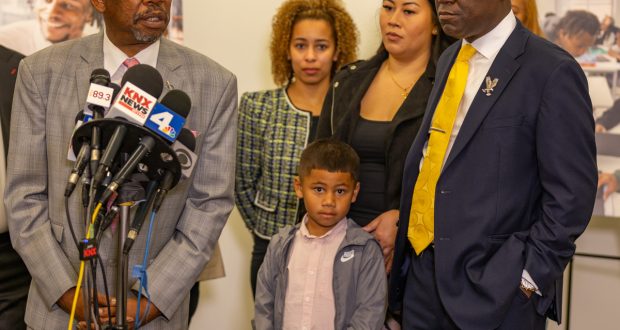By Maxim Elramsisy | California Black Media
Civil Rights and personal Injury attorneys Benjamin Crump and Carl Douglas announced a $100 million lawsuit against the City of Los Angeles last week for the death of Keenan Anderson, a high school English teacher visiting Los Angeles from Washington D.C.
The attorneys are representing Anderson’s son, Syncere Anderson, and Syncere’s mother Gabrielle Hansell.
The complaint alleges civil rights violations, assault and battery, false imprisonment, and negligence on the part of Los Angeles Police Department (LAPD) officers in the death of Anderson.
“They are trying to George Floyd me,” Anderson said as he lay face down on the street in Venice, California on January 3. The 30-year-old died later at a hospital after body-camera footage shows him being tased at least six times by LAPD officers.
“[He is] calling out to the public when he’s on the ground being tased and squashed. He’s calling for help. He was anticipating his own injury,” Douglas, said to California Black Media (CBM).
“When you think about Black people, our fear is that every time police stop us, they might do us like George Floyd,” Crump said to CBM.
The LA County Medical Examiner-Coroner reported in early June that Anderson’s cause of death was an enlarged heart and cocaine use and reported manner of death as undetermined.
The attorneys argue the report is irrelevant.
“After they assassinated him, they tried to assassinate his character. That is the strategy, tried and true, in America when the police kill Black people,” Crump said. “Look at that video, your eyes are not deceiving you. What killed [Anderson] was an overdose of lethal force, it’s that simple. If he were not tased, he would be here today.”
They believe the video shows that the use of force by police was inappropriate in this situation.
“It matters not whether there was cocaine in his system, because the actions of the officers were wrong. It matters not why he was in distress, because it’s clear from the body camera footage that he was never a threat. He spoke to the officers politely. He was always compliant; he never balled his fist, he never kicked. He never did anything to give an officer the belief that he was a threat.
Instead, these officers acted like hammers. And when you send a hammer into a garden, they treat all the flowers like their nails,” Douglas said to CBM.
“They did not know that Keenan Anderson was a schoolteacher of high school students. They didn’t know he had a five-year-old boy who loved him and he was engaged in his young son’s life. They didn’t know he was a role model to dozens of other kids across the country.”
“It resonated with me because I was so close to George Floyds family,” said Crump, who represented the family in a lawsuit against the city of Minneapolis.
“The one thing that I think is similar is just the fact that Black people who have mental health crises, man, we get the death sentence,” Crump said. “When White people have mental health crises, everybody is trying to help them.”
This month the U.S. Department of Justice released a report outlining systemic problems in the Minneapolis Police Department. It said police officers used “unjustified deadly force” and other types of force, and that they “unlawfully discriminate” against Black and Native American people, violate the rights of people engaged in protected speech, and discriminate against people with behavioral health issues.
There were similar findings in Los Angeles Police Department after the Rampart Scandal uncovered corruption.
“20 years ago, there was a finding that there were systemic problems in the Los Angeles Police Department and there was a consent decree,” Douglas said. “The problem is there is a warrior mentality that envelops law enforcement: us versus them; military equipment against citizens instead of a guardian mentality to protect and serve, to help.”
L.A. Mayor Karen Bass discussed the incident with CBM in February.
“People have died at the hands of the LAPD. You had those three deaths in one week, which was really horrific from my point of view,” Bass said. “With my medical background, I looked at those tapes unedited, and I saw two people in serious crisis.”
Bass also described assurances she received from Los Angeles Police Chief Michael Moore. She said, “Part of my agreement in supporting him was that we identified a group of objectives of what I want to see done. I am insisting that every officer be trained in mental health to spot crises.”
“The Commitment I made to the chief was to work to increase the funding for mental health, social workers, so that they can go out and be part of these assessments, because I believe if those officers had been accompanied by a mental health professional that it may not have escalated the way it did.”
A June 23 statement from Mayor Bass’ office to CBM stated, “The Mayor’s approved budget has money to continue funding the SMART teams. The primary challenge isn’t lack of funding for these positions but a shortage of licensed clinicians who work alongside the officers to respond to people experiencing mental health crises. The Mayor’s Office is working with our partners at LAPD and LA County Department of Mental Health to pursue strategies to hire additional licensed clinicians.”
The LA City Attorney declined to comment for this article, citing pending litigation.
 Westside Story Newspaper – Online The News of The Empire – Sharing the Quest for Excellence
Westside Story Newspaper – Online The News of The Empire – Sharing the Quest for Excellence





